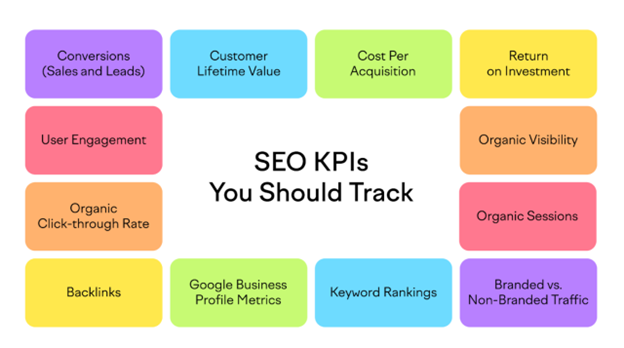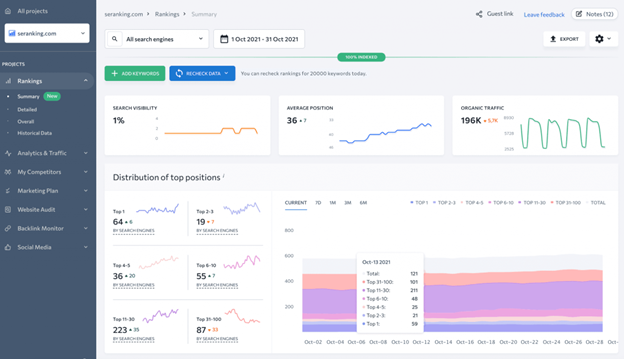Keyword Monitoring: Tips, Strategy, and Tools for Success
Search engine optimization is a crucial component for increasing brand reach and visibility. The integration of keywords allows organizations to connect with their audience through the online searches they conduct. However, with the volatile nature of trends, it can become overwhelming to keep up with the pace of new keyword optimizations.
Keyword monitoring provides businesses and organizations with a tool that allows them to oversee the position and performance of their website. In this blog, we will explore the concept of keyword monitoring and uncover the tips, strategies, and tools you need to promote your visibility and aim for success.
What is Keyword Monitoring?
Keyword monitoring is the systematic examination and study of specific terms or phrases relevant to a company on various digital media. Effective marketing activity optimization requires monitoring the performance, variations, and trends related to these keywords.
Keyword monitoring is the process of tracking current keywords to determine their success and adjust marketing plans accordingly. This is different from keyword research, which looks for new keyword prospects. In keyword monitoring, companies actively participate in continuous analysis to find useful information and guide strategic decision-making.
With this incremental strategy, marketers can take advantage of new trends, modify their real-time strategies, and reduce risks. Monitoring keywords explores more subtle context, mood, and user intention. It aims to learn not just what people are looking for but also why they are looking and how they interpret the outcomes they come across.
Why is Keyword Monitoring Important?
The concept of keyword monitoring provides brands and organizations with the following benefits:
Improved Visibility and Search Ranking
Companies can evaluate search engine ranking positions (SERPs) through keyword monitoring, ensuring optimal visibility for their target audience. Marketers may identify areas for improvement by monitoring keyword performance and adjusting their SEO plans as needed. This can help increase natural traffic and brand exposure.
Competitive Analysis
Knowing where rivals stand for particular keywords helps companies spot unrealized potential or possible threats and important insights about market dynamics. By monitoring competitor keyword tactics, businesses can benchmark their success, identify market gaps, and formulate strategies to outperform their competitors, especially in SEO law firm marketing.
Content Optimization
Keyword monitoring helps create interesting and pertinent material that speaks to the intended audience’s search intent. Marketers can use keyword trends to align their content strategy with search engine algorithms and user preferences. As a result, marketers keep content current, relevant, and optimized for higher search engine visibility and user interaction.
ROI Tracking
Good keyword monitoring links keyword performance to website traffic, lead generation, and conversion metrics, therefore facilitating the evaluation of return on investment (ROI) for marketing efforts. High-converting keywords can help companies manage resources more effectively and maximize their marketing expenditures.
“First, you need good analytics to measure and show marketing ROI. You can’t measure something if you don’t have the right information, says Mark Anderson, Founder of Anderson Injury Lawyers. “Start by clearly defining your goal to ensure that you move in the right direction. Understanding your goals will help you determine the success or failure of your campaign and give you a better understanding of which marketing efforts are worth your time.”
By implementing a keyword monitoring system, companies can bolster their online presence and be on the lookout for valuable and useful keyword opportunities.
Key Metrics To Measure When Monitoring Keywords

Keep the following key metrics in mind when monitoring keywords to receive the most helpful insights:
- Search Volume: The number of searches conducted for a keyword within a specific timeframe can indicate its popularity and potential reach. Content creation and optimization efforts typically prioritize keywords with higher search volumes, as they indicate higher demand.
- Keyword Ranking: Search engine keyword rankings let marketers measure their exposure and evaluate the success of their SEO campaigns. Monitoring keyword placements helps companies spot changes, patterns, and chances for development, guaranteeing ongoing exposure in search results.
- Click-Through Rate (CTR): This statistic shows how many people click on a search result after typing in a specific keyword, reflecting the relevancy and attraction of the result to the intended audience. Through tracking CTR statistics, marketers may assess how well title tags, meta descriptions, and search snippets draw in clicks and increase organic traffic.
- Conversion Rate: Tracking the conversion rate linked to specific keywords makes pinpointing effective terms that produce real business results easier. By monitoring keyword conversion analytics, businesses can increase conversion rates and generate more leads or sales by refining calls-to-action, landing pages, and conversion funnels.
- Keyword Difficulty: Knowing how competitive particular phrases are helps you prioritize work and allocate resources wisely. High-difficulty keywords could need more aggressive SEO techniques or long-term plans, whereas low-difficulty keywords offer chances for fast success and focused optimization efforts.
These key metrics will provide well-rounded information to track the most effective and value-adding keywords.
How to Monitor Keywords

Let’s look at the features of the SE Ranking Dashboard, an all-inclusive SEO tool that simplifies keyword tracking and analysis, as an example of the keyword monitoring process:
- Keyword Tracking: SE Ranking lets users enter a list of desired keywords and see how they are doing on Google, Bing, and Yahoo, among other search engines. The dashboard helps companies monitor keyword performance and spot patterns over time through real-time updates on ranks, search volume, and competitor data.
- Competitor Analysis: Marketers can conduct a comprehensive competitor analysis by comparing keyword rankings, backlink profiles, and organic traffic metrics using SE Ranking. Businesses can take advantage of market gaps and seize expansion opportunities. By monitoring competitor keyword strategies, businesses can gain valuable insights and modify their keyword targeting and optimization strategies accordingly.
- Customized Reporting: The platform’s configurable reporting tools enable users to create comprehensive keyword performance reports tailored to their needs. Users can present these findings to clients or stakeholders to demonstrate the effectiveness of SEO tactics and justify the expenditure on keyword monitoring software. Customized reports contain key indicators, performance trends, competitor information, and practical optimization ideas.
- Ranking Alerts: SE Ranking automatically alerts users to major keyword placement changes or search engine algorithm adjustments. Marketers who take this proactive stance can quickly modify their plans and keep their competitive advantage. Real-time keyword performance alerts enable companies to see new trends, seize chances, and reduce the risks related to changes in search ranks.
With this process, users can maintain active insight into the keyword monitoring procedure and reap its benefits.
Common Keyword Types for Monitoring
The following keyword types are essential for monitoring, as they allow you to maximize the potential of your content:
1. Branded Keywords
Branded keywords are terms that immediately link to a brand or business name. Monitoring branded terms facilitates brand consistency, protects online reputation, and identifies brand sentiment trends. Businesses can track branded keywords to monitor mentions of their brands, attitudes, and consumer comments. This allows them to answer consumer questions or concerns and preserve brand equity quickly.
2. Target Keywords
Keywords are specific words or phrases related to a firm’s offers, services, or goods. Target keywords must be monitored to improve search engine visibility and increase qualified website traffic. By monitoring target keywords, businesses can find opportunities for optimization, content production, and audience targeting, thereby guaranteeing that their website ranks highly for pertinent searches and draws in high-quality traffic.
3. Industry Keywords
An industry’s unique keywords relate to more general issues, trends, or concepts associated with that industry or niche. By tracking industry keywords, businesses can stay up-to-date on market changes, new trends, and customer preferences. Through industry keyword monitoring, companies can find thought leadership topics, content possibilities, and keyword trends that appeal to their target audience, increasing their authority and visibility in the market.
4. Money-Generating Keywords
Transactions, product names, or service offers contain terms directly contributing to income generation. Optimizing conversion funnels and increasing income potential requires constant monitoring of money-generating keywords. Companies can track money-generating keywords, optimize product pages, and find high-intent search queries to increase sales and income. Transactional keywords can help companies find opportunities for upselling, cross-selling, and promotional activities, which increase total profitability and maximize client lifetime value.
By selecting the right keywords to monitor, you can gain valuable insights into various aspects of your online presence and target audience. Combining these various keyword types allows you to refine your monitoring and focus on the most relevant information for your needs.
Conclusion
Good keyword monitoring is essential for succeeding online in the extremely competitive digital world. By using the appropriate tools, tactics, and analytics, businesses can boost search engine exposure, get important engagement, and learn a great deal about customer behavior. Maintaining competitiveness and success over the long run depends on keyword monitoring and being alert and flexible as consumer tastes change and technology advances.
Accept the potential of keyword monitoring to seize fresh chances, stay ahead of the competition, and achieve success with your digital marketing campaigns. Businesses can position themselves for success in the digital world by using the most effective keyword-monitoring strategy.




